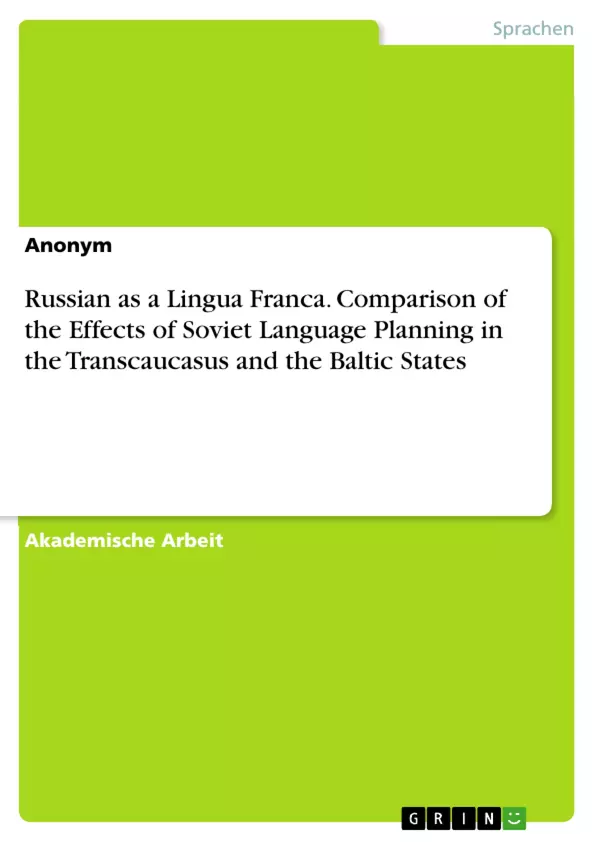This paper aims to examine and compare the impact of the effects of Soviet language planning in the Transcaucasus territory and the Baltic States by taking a closer look at the relation between culture, politics, and language. In order to achieve this, the points The Transcaucasus and the Baltic States, Major ethnicity and language differences, Differences to language situation and differences to literacy and written culture in the Soviet Union, Influence of the Soviet language policy and major similarities and dissimilarities, Status of the Russian language by the end of the Soviet Union and today are examined leading towards the conclusion of this term paper.
Being the official language of Russia, Belarus, Kazakhstan and Kyrgyzstan as well as being widely spoken throughout the Baltic states, the Caucasus and Central Asia the Russian language is one of the top ten most widely used languages in Europe respectively Eurasia. According to the number of speakers – 260.000 worldwide in 2012 with 150.000 of them being native speakers – Russian can be considered a world language which plays an important role as a lingua franca throughout the post-Soviet region.
It is one of the six official United Nations languages and also the second most widespread language on the internet. Large numbers of Russian speakers can also be found in Mongolia and Israel. Belonging to the family of East Slavic languages it is written in with the Cyrillic alphabet and being closely related to Belarusian and Ukrainian. The Russian language – or русский язык as it is written in the Cyrillic standard script – belongs to the branch of the Slavic languages and partly to the Balto-Slavic branch of the Indo-European language tree. The language was influenced and shaped by a number of factors of cultural and political nature such as reforms of the Russian Empire and Soviet Union.
Inhaltsverzeichnis
- Introduction
- The Transcaucasus and the Baltic States
- Major ethnic and linguistic differences and differences to language situation, literacy, and written culture in the Soviet Union
- Influence of the Soviet language policy and major similarities and dissimilarities...
- Status of the Russian language by the end of the Soviet Union and today
Zielsetzung und Themenschwerpunkte
Dieser Text befasst sich mit der Untersuchung und dem Vergleich der Auswirkungen der sowjetischen Sprachplanung im Gebiet des Transkaukasus und in den baltischen Staaten. Er analysiert den Zusammenhang zwischen Kultur, Politik und Sprache, um die Auswirkungen der Sowjetzeit auf die Entwicklung des Russischen als Lingua Franca zu beleuchten.
- Die Rolle der sowjetischen Sprachpolitik in den Transkaukasus- und Baltischen Staaten
- Ethnische und sprachliche Unterschiede in den Regionen
- Der Einfluss der sowjetischen Sprachpolitik auf die Sprachsituation, die Alphabetisierung und die schriftliche Kultur
- Gemeinsamkeiten und Unterschiede in der Entwicklung des Russischen als Lingua Franca
- Der Status des Russischen am Ende der Sowjetunion und im heutigen Kontext
Zusammenfassung der Kapitel
Das erste Kapitel bietet eine Einführung in das Thema Russisch als Lingua Franca und die Entwicklung des Russischen im Laufe der Geschichte. Es beleuchtet die Rolle des Russischen im postsowjetischen Raum und seine Bedeutung als Weltsprache.
Das zweite Kapitel stellt die geographischen und politischen Gegebenheiten des Transkaukasus und der baltischen Staaten vor. Es beschreibt die Geschichte der Regionen und ihre Verbindungen zur Sowjetunion.
Das dritte Kapitel analysiert die ethnischen und sprachlichen Unterschiede zwischen den Transkaukasus- und den baltischen Staaten. Es vergleicht die Sprachsituation, die Alphabetisierung und die schriftliche Kultur in beiden Regionen.
Schlüsselwörter
Die zentralen Themen des Textes sind die sowjetische Sprachpolitik, der Status des Russischen als Lingua Franca, die sprachliche und kulturelle Entwicklung im Transkaukasus und in den baltischen Staaten, ethnische und sprachliche Vielfalt, und die Auswirkungen der Sowjetunion auf die Sprachsituation in den ehemaligen Sowjetrepubliken.
Häufig gestellte Fragen
Was bedeutet Russisch als "Lingua Franca"?
Es bedeutet, dass Russisch als gemeinsame Verkehrssprache zwischen Sprechern verschiedener Muttersprachen im postsowjetischen Raum genutzt wird.
Wie beeinflusste die sowjetische Sprachplanung den Transkaukasus?
Die Arbeit untersucht, wie das Russische in Gebieten wie Georgien oder Armenien implementiert wurde und welche Rolle ethnische Unterschiede dabei spielten.
Wie unterscheidet sich die Sprachsituation in den baltischen Staaten?
Im Vergleich zum Kaukasus analysiert die Arbeit die spezifischen Auswirkungen der Russifizierung und den Erhalt der nationalen Identität in Estland, Lettland und Litauen.
Welchen Status hat die russische Sprache heute weltweit?
Mit rund 260 Millionen Sprechern gilt Russisch als Weltsprache, ist eine der sechs UN-Sprachen und die zweithäufigste Sprache im Internet.
Welchen Einfluss hatte die Alphabetisierung in der Sowjetunion?
Die sowjetische Politik förderte massiv die Schriftkultur und Alphabetisierung, nutzte dies jedoch gleichzeitig als Instrument zur Verbreitung des Russischen.
- Citar trabajo
- Anonym (Autor), 2020, Russian as a Lingua Franca. Comparison of the Effects of Soviet Language Planning in the Transcaucasus and the Baltic States, Múnich, GRIN Verlag, https://www.grin.com/document/975887



